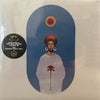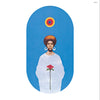



Luis Gasca - For Those Who Chant
Trumpet, Flugelhorn – Luis Gasca
Guitar – Carlos Santana [click here to see more Vinyl/SACD featuring Carlos Santana]
Guitar - Neal Schon
Bass – Stanley Clark
Congas – Mike Carabello, Victor Pantoja
Drums – Lenny White, Mike Shrieve
Flute – Hadley Caliman
Organ – Richard Kermode
Cosmic Dog – Moon
Percussion – Snooky Flowers, Garnette Mims, Joan MacGregor, Rico Reyes
Piano, Electric Piano – George Cables, Greg Rolie*, Mark Levine
Tenor Saxophone – Joe Henderson
Timbales – Carmelo Garcia, Coke Escovedo
Vibraphone – José "Chepito" Areas
Written by Luis Gasca (A1-2, B2), Luis Gasca (B1), Don Menza (B1)
1 LP, standard sleeve
Original analog Master Tape : YES
Heavy Press : 180g
Record Color : Black
Speed : 33 RPM
Size : 12''
Stereo
Studio
Record Press : Third Man Pressing in Detroit, MI
Label : Verve - Verve By Request Series
Original Label : Blue Thumb Records
Recorded August 17 & 18, 1971 at San Francisco's Columbia Studios
Engineered by Glen Kolotkin, Mike Larner
Mixed by Ken Hopkins, Luis Gasca, Stan Marcum
Produced by Luis Gasca, Stan Marcum
Painting by Phillip Lindsay Mason
Photography by Victor Aleman
Originally released in 1972
Reissued in 2024
Tracks:
Side A:
1. Street Dude
2. La Raza
Side B:
1. Spanish Gypsy
2. Little Mama
Reviews :
"Luis Gasca was one of the hottest trumpet players in California during the 1970s, recording a handful of albums fueled by the drugs, the culture, and the excitement of that time and place. Though they all featured large ensembles, only one of them allowed some of the era's most legendary musicians to blur the lines separating jazz, latin, and rock and roll.
"Everyone should have two favorite cities; their own and San Francisco," claimed Gasca. It was there, at the now-defunct Columbia Studios, that For Those Who Chant was recorded. Which makes sense, given the history of its contributors. Along with Gasca himself was a young George Cables, who spent most of the seventies on the west coast, building a reputation as a reliable, inventive pianist for numerous frontmen. This included saxophonist Joe Henderson, who had a large footprint on this album. Carlos Santana was joined by Neal Schon and Gregg Rolie; both would leave his band a year later to form Journey, eventually dedicating their first hit song "Lights" to the city by the bay.
Just in case that didn't ramp expectations into the stratosphere, the menagerie of talent on flute, percussion, timbales, congas, and drums were rounded out by Grammy-winning bassist Stanley Clarke.
For Those Who Chant wears its excesses well, pitting the 'cool' sounds of the west coast against the technical prowess of its lineup. Even at an immodest eleven minutes in length, "Street Dude" is served up as an appetizer for the album. It's there to ease listeners into the experience. Not that Gasca wastes any time setting the mood—the trumpeter charges out unrestrained over what could easily pass for vintage Santana. He closes the song by making good on the title's premise, with tribal chanting and chattering sweeping it into a fade out.
Tense percussion and piano drive the tension of "La Raza" as Henderson and Gasca blow wild lines over an increasingly chaotic setting. As that tension stretches to a breaking point, the band flips a switch and eases the rhythm back to something manageable. "Spanish Gypsy" opens with chimes and a heavy bass line from Clark. A pattering of congas fades away as the band feints into a second start, and it's most evident here how thoroughly they've managed to meld the multi-genre influences. Cables is finally given something more to do that act as an accompanist, but unfortunately doesn't have adequate time to take advantage of it. The biggest disappointment this recording delivers is that he and both guitarists serve more as ambience than soloists, but "Spanish Gypsy" is an extended enough piece to highlight their input to some degree.
The album ends with "Little Mama," a sub-six minute composition which feels a little tacked on after the bombast of its predecessor. While the tune doesn't quite have the chops one might anticipate, it serves well as a nightcap to a wild studio party; one with enough intricacy behind it to reward those who pay close enough attention to pick out the contributions of each musician.
Luis Gasca would release two more recordings after this one before disappearing completely. The excesses of the time and trade were taking their toll on both himself and his contemporaries. "I stopped (playing) because I was self destructive. I was burned out," he admitted. "That's when I knew it was time for me to go." He came to realize that in order to save the musician, he had to sacrifice the music. That which he made, both as leader and with such luminaries as Janis Joplin, Van Morrison, and Stan Kenton, are the bright remains of a very specific period. For Those Who Chant has one hell of a pedigree. The results mostly live up to the expectations that creates, offering up an effort ripe with unbridled enthusiasm." All About Jazz Review by Peter J. Hoetjes
Ratings :
AllMusic : 4.5 / 5 ; Discogs : 4.28 / 5



